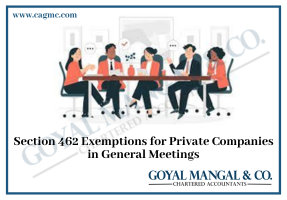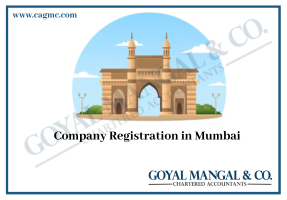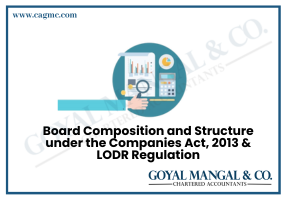
The Companies (Auditor’s Report) Order, 2020 (CARO 2020) lays down the format for the independent auditor’s report. The auditor’s report is an important document that is prepared by the auditor of a company, outlining their opinion on the financial statements and internal control systems of the company. This article gives you the format of Independent Auditor’s Report for FY ending 31/03/2022. So, stay connected with us to get insightful knowledge about the Format of the Independent Auditor’s Report. .
|
Table of Content |
Short Glimpse
The independent auditor’s report is a written opinion on the financial statements of a company, which includes the balance sheet, profit and loss account, and cash flow statement. The purpose of the auditor’s report is to inform stakeholders about the auditor’s opinion on the financial statements’ fairness and accuracy. The auditor’s report is an essential tool for stakeholders to make informed decisions about the company’s financial position.
Key Considerations regarding Format of Independent Auditor’s Report as per CARO 2020
The following are the key consideration regarding Format of Independent Auditor’s Report as per CARO 2020:
- Qualification: The CARO 2020 requires the auditor to state whether the financial statements are in accordance with the accounting standards and whether they give a true and fair view of the company’s financial position. If there are any qualifications, the auditor must explain the reasons for them and their impact on the financial statements.
- Emphasis of Matter Paragraphs: The CARO 2020 requires the auditor to include an emphasis of matter paragraph in the report if there are any matters that require the stakeholders’ attention. This may include issues such as the company’s ability to continue as a going concern, significant uncertainties, or material misstatements in the financial statements. The auditor must also explain the impact of these matters on the financial statements.
- Key Audit Matters: The CARO 2020 requires the auditor to include a section on key audit matters in the report. This section highlights the most significant matters that the auditor addressed during the audit and the procedures performed to address them. The key audit matters section provides stakeholders with insights into the auditor’s approach to the audit and helps them understand the auditor’s assessment of the financial statements.
- Responsibility of Management and Auditors: The CARO 2020 requires the auditor to state the responsibility of management for the preparation and presentation of the financial statements and the auditor’s responsibility for expressing an opinion on them. The auditor must also state that the audit was performed in accordance with the auditing standards and that the auditor is independent of the company.
What does Independent Auditor’s Report mean?
An independent Auditor’s Report is an official opinion issued by an external or internal auditor as to the quality and accuracy of the financial statements prepared by a company. The report is a primary source of communication between the auditor and users of financial statements.
The Format of Independent Auditor’s Report
INDEPENDENT AUDITOR’S REPORT
To
The Members of ABC Private Limited
Report on the audit of the financial statements
Opinion
- Opinion We have audited the accompanying Financial Statements of ABC Private Limited (“the Company”), which comprise the Balance Sheet as at March 31, 2022, and the Statement of Profit and Loss and Statement of Cash Flows for the year ended on that date, and notes to the Financial Statements, including a summary of significant accounting policies and other explanatory information (Hereinafter referred to as Financial Statements).
- In our opinion and to the best of our information and according to the explanations given to us, the aforesaid financial statements give the information required by the Companies Act, 2013 in the manner so required and give a true and fair view in conformity with the accounting principles generally accepted in India, of the state of affairs of the Company as at March 31, 2022, its Profit/Loss, changes in equity and its cash flows for the year ended on that date.
Basis for Opinion
- We conducted our audit of the financial statements in accordance with the Standards on Auditing (SAs) specified under section 143(10) of the Companies Act, 2013. Our responsibilities under those Standards are further described in the Auditor’s responsibilities for the audit of the Financial Statements section of our report. We are independent of the Company in accordance with the code of ethics issued by the Institute of Chartered Accountants of India (ICAI) together with the ethical requirements that are relevant to our audit of the Financial Statements under the provisions of the Act and the rules thereunder, and we have fulfilled our other ethical responsibilities in accordance with these requirements and the ICAI’s code of ethics. We believe that the audit evidence we have obtained is sufficient and appropriate to provide a basis for our opinion on the financial statements.
Key Audit Matters (If Desired)
- Key Audit Matters are those matters that in our professional judgment were of most significance in our audit of the Financial Statements of the current period. These matters were addressed in the context of our audit of the Financial Statements as a whole, and in forming our opinion thereon, and we do not provide a separate opinion on these matters. Reporting of key audit matters as per SA 701, Key Audit Matters are not applicable to the Company as it is an unlisted company.
Other information – Board of Directors Report
- The Company’s Board of Directors are responsible for the preparation of the other information. The other information comprises the information included in the Board’s Report including Annexure(s) to Board’s Report, but does not include the Financial Statements and our auditor’s report thereon.
Our opinion on the Financial Statements does not cover the other information and we do not express any form of assurance conclusion thereon.
- In connection with our audit of the Financial Statements, our responsibility is to read the other information and, in doing so, consider whether the other information is materially inconsistent with the Standalone Financial Statements or our knowledge obtained during the course of our audit or otherwise appears to be materially misstated. If, based on the work we have performed, we conclude that there is a material misstatement of this other information; we are required to report that fact. We have nothing to report in this regard.
Managements responsibility for the Financial Statements
- The Company’s Board of Directors are responsible for the matters stated in section 134(5) of the Act with respect to the preparation of these Financial Statements that give a true and fair view of the financial position, financial performance, changes in equity and Cash Flows of the Company in accordance with the accounting principles generally accepted in India, including the Accounting Standards specified under section 133 of the Act. This responsibility also includes maintenance of adequate accounting records in accordance with the provisions of the Act for safeguarding of the assets of the Company and for preventing and detecting frauds and other irregularities; selection and application of appropriate accounting policies; making judgments and estimates that are reasonable and prudent; and design, implementation and maintenance of adequate internal financial controls, that were operating effectively for ensuring the accuracy and completeness of the accounting records, relevant to the preparation and presentation of the financial statement that give a true and fair view and are free from material misstatement, whether due to fraud or error.
- In preparing the Financial Statements, management is responsible for assessing the Company’s ability to continue as a going concern, disclosing, as applicable, matters related to going concern and using the going concern basis of accounting unless management either intends to liquidate the Company or to cease operations, or has no realistic alternative but to do so. The Board of Directors are also responsible for overseeing the Company’s financial reporting process.
Auditor’s Responsibilities for the audit of the Financial Statements
- Our objectives are to obtain reasonable assurance about whether the standalone Financial Statements as a whole are free from material misstatement, whether due to fraud or error, and to issue an auditor’s report that includes our opinion. Reasonable Assurance is a high level of assurance, but is not a guarantee that an audit conducted in accordance with SAs will always detect a material misstatement when it exists. Misstatements can arise from fraud or error and are considered material if, individually or in the aggregate, they could reasonably be expected to influence the economic decisions of users taken on the basis of these Financial Statements.
- As part of an audit in accordance with SAs, we exercise professional judgment and maintain professional scepticism throughout the audit.
- Identify and assess the risks of material misstatement of the Financial Statements, whether due to fraud or error, design and perform audit procedures responsive to those risks, and obtain audit evidence that is sufficient and appropriate to provide a basis for our opinion. The risk of not detecting a material misstatement resulting from fraud is higher than for one resulting from error, as fraud may involve collusion, forgery, intentional omissions, misrepresentations, or the override of internal control.
- Obtain an understanding of internal control relevant to the audit in order to design audit procedures that are appropriate in the circumstances. Under section 143(3) of the Companies Act, 2013, we are also responsible for expressing our opinion on whether the company has adequate internal financial controls system in place and the operating effectiveness of such controls.
- Evaluate the appropriateness of accounting policies used and the reasonableness of accounting estimates and related disclosures made by management.
- Conclude on the appropriateness of management’s use of the going concern basis of accounting and, based on the audit evidence obtained, whether a material uncertainty exists related to events or conditions that may cast significant doubt on the Company’s ability to continue as a going concern. If we conclude that a material uncertainty exists, we are required to draw attention in our auditor’s report to the related disclosures in the Financial Statements or, if such disclosures are inadequate, to modify our opinion. Our conclusions are based on the audit evidence obtained up to the date of our auditor’s report. However, future events or conditions may cause the Company to cease to continue as a going concern.
- Evaluate the overall presentation, structure and content of the Financial Statements, including the disclosures, and whether the Financial Statements represent the underlying transactions and events in a manner that achieves fair presentation.
- Materiality is the magnitude of misstatements in the financial statements that, individually or in aggregate, makes it probable that the economic decisions of a reasonably knowledgeable user of the financial statements may be influenced. We consider quantitative materiality and qualitative factors in (i) planning the scope of our audit work and in evaluating the results of our work; and (ii) to evaluate the effect of any identified misstatements in the financial statements.
- We communicate with those charged with governance regarding, among other matters, the planned scope and timing of the audit and significant audit findings, including any significant deficiencies in internal control that we identify during our audit.
- We also provide those charged with governance with a statement that we have complied with relevant ethical requirements regarding independence, and to communicate with them all relationships and other matters that may reasonably be thought to bear on our independence.
Report On Other Legal and Regulatory Requirements
- As required by Section 143(3) of the Act, we report that:
- We have sought and obtained all the information and explanations which to the best of our knowledge and belief were necessary for the purposes of our audit
- In our opinion, proper books of account as required by law have been kept by the Company so far as it appears from our examination of those books;
- The Balance Sheet, the Statement of Profit And Loss, and the Cash Flows Statement dealt with by this report are in agreement with the books of account
- In our opinion, the aforesaid Financial Statements comply with the accounting standards specified under section 133 of the Act, read with rule 7 of the Companies (Accounts) Rules, 2014 Companies (Accounts) Rules, 2014 G.S.R. 239
- On the basis of the written representations received from the directors as on March 31, 2022 taken on the record by the Board of Directors, none of the directors is qualified as on March 31, 2022 from being appointed as a director in terms of Section 164(2) of the Act.
- In our opinion, the provisions of Section 143(3)(i) with regard to opinion on internal financial controls with reference to financial statement and operating effectiveness of such controls is not applicable for the company.
- With respect to the other matters to be included in the Auditor’s Report in accordance with Rule 11 of the Companies (Audit and Auditors) Rules, 2014, in our opinion and to the best of our information and according to the explanations given to us
- The Company does not have any pending litigations which would impact its financial position.
- The Company did not have any long-term contracts including derivatives contracts for which there were any material foreseeable losses.
- There were no amounts which required to be transferred to the Investor Education and Protection Fund by the Company.
- The management has represented that, to the best of its knowledge and belief, other than as disclosed in the notes to the accounts, no funds have been advanced or loaned or invested (either from borrowed funds or share premium or any other sources or kind of funds) by the company to or in any other person(s) or entity(ies), including foreign entities (“Intermediaries”), with the understanding, whether recorded in writing or otherwise, that the Intermediary shall, whether, directly or indirectly lend or invest in other persons or entities identified in any manner whatsoever by or on behalf of the company (“Ultimate Beneficiaries”) or provide any guarantee, security or the like on behalf of the Ultimate Beneficiaries
- The management has represented, that, to the best of its knowledge and belief, other than as disclosed in the notes to the accounts, no funds have been received by the company from any person(s) or entity(ies), including foreign entities (“Funding Parties”), with the understanding, whether recorded in writing or otherwise, that the company shall, whether, directly or indirectly, lend or invest in other persons or entities identified in any manner whatsoever by or on behalf of the Funding Party (“Ultimate Beneficiaries”) or provide any guarantee, security or the like on behalf of the Ultimate Beneficiaries
- Based on audit procedures which we considered reasonable and appropriate in the circumstances, nothing has come to our notice that has caused us to believe that the representations under sub-clause (i) and (ii) contain any material mis-statement.
- The company has not declared or paid any dividend during the year in contravention of the provisions of section 123 of the Companies Act, 2013.
For
Chartered Accountants
Firm registration number
Name
Partner
Membership number
UDIN
Date
Place
Takeaway
CARO 2020 is a new format for issue of audit reports in case of statutory audits of companies under the Companies Act, 2013. This format is not an exclusive format and appropriate changes should be made as per the situations and circumstances. The format has been taken from the following website:







